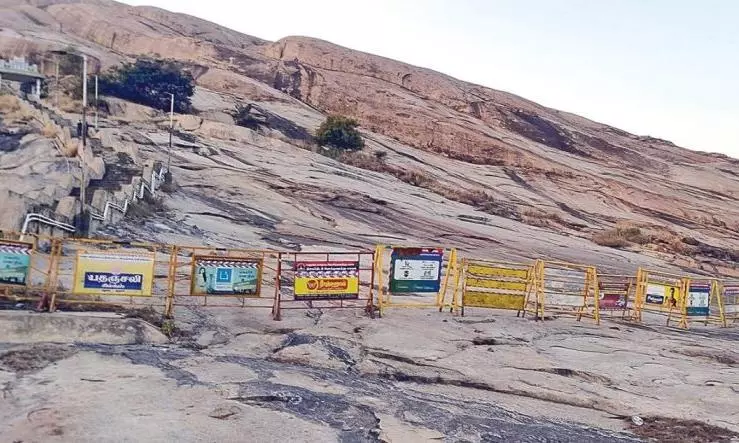
Thiruparankundram temple-mosque case referred to 3rd judge after split verdict
The Madras HC Chief Justice will appoint a third judge to decide on whether to ban animal sacrifices at the Sikandar Badusha Dargah on the Thiruparankundram hillock

The Madurai Bench of the Madras High Court has referred a sensitive case concerning a ban on animal sacrifices at the Sikandar Badusha Dargah, located on the Thiruparankundram hillock near Madurai, to a third judge. This followed a split verdict by Justices J Nisha Banu and R Srimathi.
Petitions filed by Madurai residents, including Ramalingam, Paramasivam, and Abdul Jabbar, sought to prohibit the practice of sacrificing goats and chickens at the dargah. The Chief Justice of the Madras High Court will now determine the third judge to hear the case, marking a critical juncture in the long-standing temple-mosque dispute.
Hillock with temple and mosque
The Thiruparankundram hillock hosts both the Arulmigu Subramaniya Swamy Temple, one of the six abodes of Lord Murugan in Tamil Nadu (called 'Arupadai Veedu'), and the Sikandar Badusha Dargah atop the hill, referred to as Sikandar Malai by the Muslim community.
The coexistence of these religious sites has been mostly peaceful. Historical records do cite a similar conflict in 1915-16 that required government mediation.
Also Read: Thiruparankundram Hill cases: Madras HC defers verdict without date
The current legal proceedings stem from petitions challenging the practice of animal sacrifices, specifically goats and chickens, at the dargah. The petitioners, including Ramalingam, Paramasivam, and Abdul Jabbar, argued that such practices on the hillock, which is considered sacred by both communities, violate the sanctity of the area and disrupt communal harmony.
The case has reignited debates over religious practices, land usage, and historical agreements governing the shared space.
Split verdict
The two-judge bench of the Madurai Bench heard the petitions but delivered conflicting rulings, necessitating the referral to a third judge.
Justice Nisha Banu dismissed all petitions seeking a ban on animal sacrifices at the dargah, reportedly citing a lack of sufficient legal grounds or evidence to impose such a restriction. Her ruling emphasised maintaining the status quo, aligning with historical practices allowed at the dargah.
Also Read: Ground Report: How fake narratives have kept Thiruparankundram on its toes
Justice Srimathi delivered an opinion partially supporting the petitioners’ plea to prohibit animal sacrifices. The split verdict has prompted the court to escalate the matter to the Chief Justice, who will appoint a third judge to review the case and deliver a binding decision.
Renewed disputes
The Thiruparankundram dispute has a historical background. In 1915-16, tensions over the hillock’s usage led to government intervention to mediate between the Hindu and Muslim communities. The agreements established at the time allowed both communities to practise their faiths while respecting shared boundaries. However, recent decades have seen renewed disputes.
Also Read: Thiruparankundram | Is there a communal rift? A Ground Report
The issue has been further complicated by broader allegations of temple vandalism in Tamil Nadu, including incidents at the Black Mariamman Temple in Coimbatore and the Ezhuperu Swamy Temple in Thirumangalam, Madurai. These events have fuelled protests by Hindutva organisations, such as the Hindu Munnani, which organised a Lord Murugan Conference on June 16, 2025, under court-regulated conditions to ensure peace.
Political dimension
The involvement of political figures like BJP leader H Raja, who faced a police inquiry for his remarks during a February 4, 2025 protest, has added a political dimension to the controversy.
Also Read: Thiruparankundram Hill cases: Madras HC defers verdict without date
The Chief Justice of the Madras High Court will now assign a third judge to hear the petitions and deliver a final ruling. The appointed judge will review the arguments presented by both sides, including the petitioners’ demand to ban animal sacrifices and the dargah’s defence of its traditional practices.

